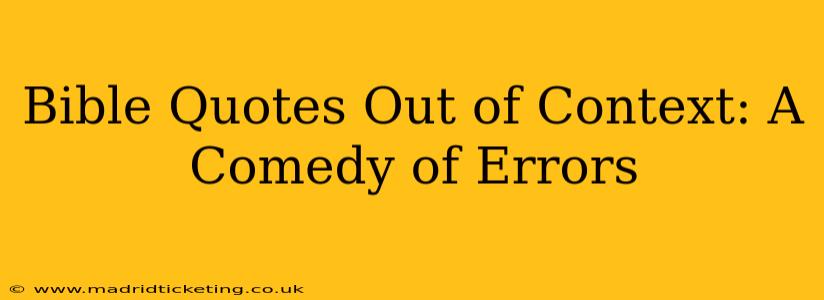The Bible, a collection of ancient texts brimming with wisdom, parables, and prophecies, has also become a surprisingly fertile ground for humorous misinterpretations. Taking verses out of their original context can lead to wildly inaccurate – and often hilarious – conclusions. This exploration delves into the comedic misuses of biblical quotes, examining why context matters and highlighting some classic examples.
Why Does Taking Bible Quotes Out of Context Matter?
The Bible, like any complex text, requires careful consideration of its historical, cultural, and literary context. Each verse is part of a larger narrative, a chapter, a book, and ultimately, the whole canon. Pulling a single phrase out of this intricate web can drastically alter its meaning. What might seem like a simple endorsement of a certain action or belief can, when viewed in context, reveal a completely different intention or message. Ignoring this context leads to misinterpretations, misunderstandings, and sometimes, comedic gold.
What are Some Examples of Bible Quotes Used Incorrectly?
Many examples exist of Bible verses taken out of context for humorous or even malicious purposes. Here are a few examples highlighting the importance of proper interpretation:
"Let he who is without sin cast the first stone." (John 8:7)
Often used to justify questionable behavior, this verse, taken from the story of the woman caught in adultery, is frequently misinterpreted as a blanket excuse for wrongdoing. However, the context reveals Jesus's compassionate challenge to the hypocrisy of the religious leaders, not a general pardon for sinful actions. The entire narrative highlights grace and forgiveness, not an invitation to moral laxity.
"An eye for an eye, a tooth for a tooth." (Exodus 21:24)
This Old Testament passage, often cited as justification for revenge, was actually a legal principle designed to limit revenge. In ancient societies, retribution could be far more brutal. The "eye for an eye" principle established a standard of proportionality, preventing excessive punishment. Taken out of context, however, it can be twisted to support a cycle of violence rather than the restraint it was intended to create.
"The meek shall inherit the earth." (Matthew 5:5)
This quote is frequently misconstrued to suggest passivity is the path to worldly success. However, the "meek" in this context refers to those who are humble, not weak. It's about humility and inner strength, not about yielding to oppression. The verse speaks to a spiritual reward, not material gain.
How Can We Avoid Misinterpreting Bible Quotes?
The key to avoiding misinterpretations is to read the Bible carefully within its context. Consider the following:
- The surrounding verses: Don't isolate a single phrase. Read the entire paragraph and even the surrounding chapters to understand the overall message.
- The book and author: Different books of the Bible have different purposes and literary styles. Understanding the author's intention is crucial.
- The historical and cultural background: The Bible was written in different times and cultures. Understanding the historical context is vital for accurate interpretation.
- Consult reputable resources: There are many excellent Bible commentaries and study guides that can offer helpful insights.
Conclusion: The Importance of Context
Using Bible quotes out of context can lead to amusing misunderstandings, but it also underscores the critical importance of careful reading and interpretation. Understanding the context of any biblical passage is paramount to grasping its true meaning and avoiding misrepresentation. While the unintentional humor arising from these misinterpretations can be entertaining, it's crucial to approach the Bible with respect and a commitment to accurate understanding. Only then can we appreciate its profound wisdom and timeless message.

